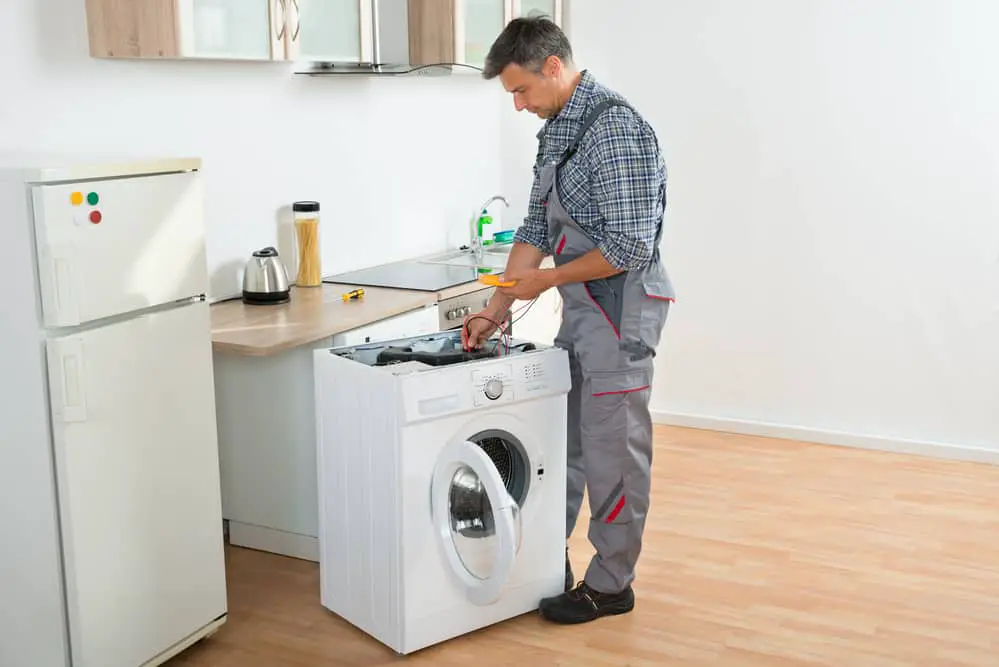Washing machines have become indispensable appliances.
They make work easier by using less water.
They are, however, delicate machines that demand utter attention.
Plenty of people still do not comprehend whether it is a good idea to turn taps off when the machine is not in use or not.
So, Should You Turn Off the Water When the Washing Machine Is Not in Use?
Yes. To conserve water and prevent potential water damage, it is advisable to keep the taps turned off when the machine is not in use. If the water is left to run continuously when the machine is not in use, the hose pipes could even be severed.
Three Reasons Why The Taps Should Be Off When the Washing Machine Is Not in Use
1. To Protect the Hose from Intense Pressure
Plenty of people do not know that leaving the water running endlessly in the hoses can cause premature wear and tear.
The more the water runs in the hoses, the more pressure it builds inside them.
The overall integrity and operation of the machine are also guaranteed.
When parts like the water hammer and the hoses are in poor condition, the washing machine may equally break down.
Valves can also be damaged by a continuous stream of water.
2. To Conserve Water
Leaving water to run in the washing machine is an act of complacency.
We live in an era where every drop of water counts.
Only let the water run when there are clothes to be cleaned inside the machine or when you are carrying out a routine cleaning.
3. To Save On Water Bills
Many people seem to overlook water bills perhaps because they might not be more expensive than other bills like energy bills.
The truth of the matter is that water bills can equally surge to an astonishing scale if water is used improperly.
You should learn how to make every drop count by conserving water. Regulating use is the surest way to save on water bills.
Four Causes of Water Leak in A Washing Machine Hoses
Many things can make your washing machine hoses leak.
Considering the gravity of water damage to home structures, you must understand all possible causes of water leaks.
In turn, you have to make sure that the issues are corrected within the shortest time possible before things can get out of hand.
1. Wear and Tear
Regardless of the washing machine you buy, wear and tear on its hose pipes is inevitable.
Pipes undergo normal wear and tear as they age.
This can cause serious water leaks.
The wear and tear on washing machine hoses are largely attributed to intense water pressure and shock that is produced during the working of the machine.
2. Poor Water Quality
When we mention poor water quality, we are talking about hard water in simple terms.
Hard water has a corroding effect on the inside of the hose pipes.
Sediment deposition leads to intense pressure which can break the pipe and cause a water leak.
3. Poor Installation
Human errors during installation can also cause the hoses to leak.
A horse connector must be fitted correctly to avoid these issues.
4. Worn Out Rubber Washer
At the end of a hose is a rubber washer. It is designed to seal off the supply valve and prevent water from leaking out of the hose.
Because of the rigorous amount of work, it is subjected to, a rubber washer can wear out over time leading to a water leak.
Five Washing Machine Preventive Care Tips and Hacks
You want your washing machine to remain in good and pristine condition. Besides, you want to make sure that it operates effectively without fail.
Here are 5 useful tips that help you maintain your washing machine under proper conditions for a long time:
1. Inspect Your Washing Machine Often
Just like all other machines and appliances in the home, certain errors can creep in unnoticed.
A routine inspection of your washing machine can help you note errors and figure out how to correct them before it is too late.
2. Replace Your Washing Machines Hoses
The frequency at which you should replace your washing machine hoses depends on the amount of work it does.
Hoses should be replaced as soon as you note serious wear and tear on them.
Ideally, it is recommended to replace them at least every 2 to 4 years.
3. Install A Water Hammer Arrestor
A water hammer arrestor absorbs the shock of water that could increase pressure in the hose and cause them to tear or break.


The longevity of your hoses is largely determined by the condition of a water hammer arrestor.
4. Turn Off the Water Taps When the Machine Is Not in Use
The main reason why you should turn off the water supply to the washing machine when not in use is to reduce the pressure exerted on the horses.
It also helps to minimize water usage. Water bills are often taken for granted until you receive a surging expense bill.
5. Seek Professional Plumbing Services
As we mentioned earlier, poor hose pipes installation can lead to water leaks.
Ensure they are properly fitted.
The best way you can do that is to hire a professional.
From, here you can rest assured your machine is working in good condition.
Only do the installation yourself when you can trust your skills enough. Otherwise hiring an expert is the best we can recommend.
Wrapping Up
Turning off the water guarantees the durability of the washing machines and their parts and saves on water use.
You want to make sure that your washing machine operates in proper conditions for a long time and you will not allow anything to stand in your way of protecting it.
References
https://www.thisoldhouse.com/plumbing/reviews/washing-machine-hoses

